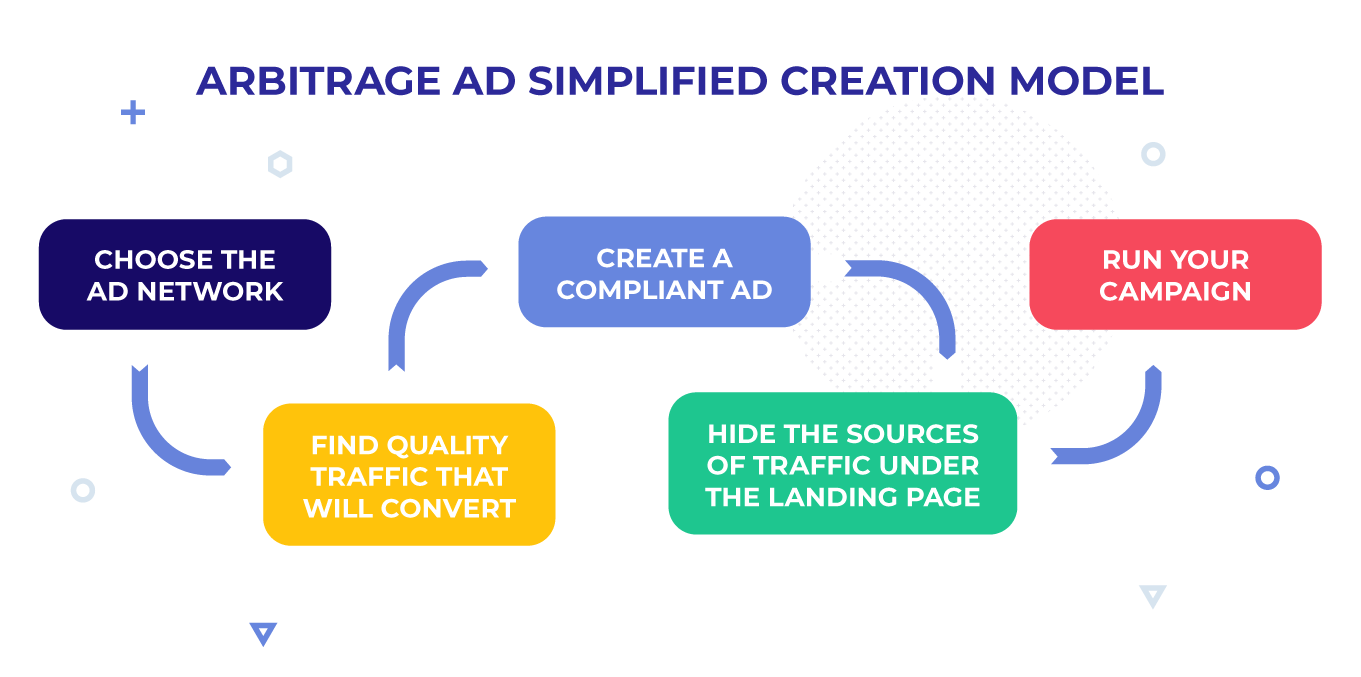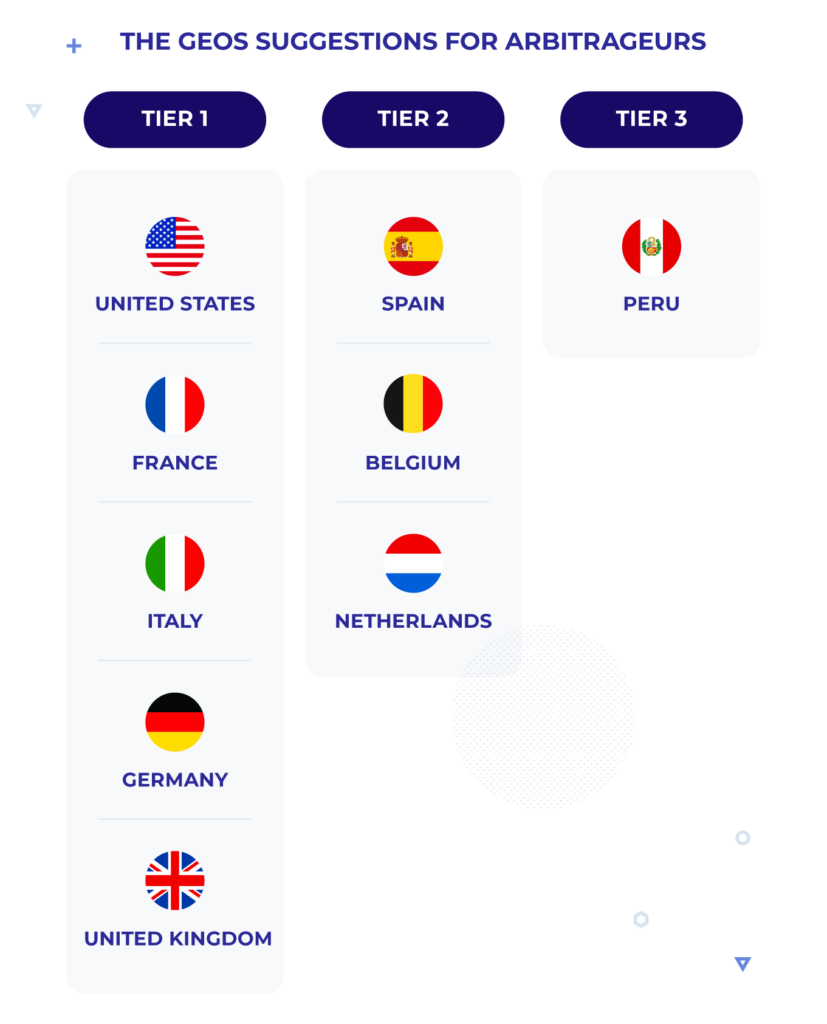Some members of the community embrace arbitrage offers and use them to the fullest. Others do not really understand the specificities, or simply do not want to get involved with it. However, there are really great ways of transcending and excelling for those who have access to Bing or Yahoo! traffic and are experienced in the topic.
This article contains our proposals on how to approach traffic arbitrage and better utilize your redirecting opportunities. Nevertheless, this industry segment is not the easiest to manage, but surely a profitable one.
Read on to discover how you can scale up your traffic arbitrage ventures.
What is traffic arbitrage?
Traffic arbitrage happens when the party buys traffic from a source and (through for example a landing page, banner ad, or native ad) redirects it to another, more expensive per click, one. It’s an opportunity to scale up and channel entirely new volumes of traffic to one offer.
In theory, it brings great results for arbitrageurs who know exactly what traffic to buy from ad networks like Bing Ads, Google Ads, or for example Yahoo!.
If you’re still asking yourself the question “How exactly does traffic arbitrage work?”, you might get a glimpse of it in the article, but do not expect precise answers. Traffic arbitrage is a very demanding segment of the industry, and without significant budgets, in-depth market knowledge, and broad experience, it will be really hard for arbitrageurs to profit.
The basis of the ROI is, in this case, a difference between a sum of money invested in the cheaper partner traffic, and the returns that are brought by the offer. Launching an ad campaign must be well-thought-out so that you do not buy non-converting arbitrage traffic. This is done via optimization and finding good impression sources.
Cost Per Action (CPA) is therefore the only measure of success for arbitrage traffic, and in many fields, it resembles the typical affiliate marketing solutions – but not entirely. The main differences are the complexity of the optimization process and the increased risk of not matching the traffic spending with the returns.
On the other hand, there is a benefit of reaching a highly converting, and safe traffic that a regular affiliate program would not be able to offer. See Zeropark’s platform to maximize your arbitrage traffic safety and conduct highly-effective Native (thanks to Tonic. cooperation) offers.
A simple pattern of creating an arbitrage ad
- Choose the right ad networks for arbitrage (for example Bing Ads, Yahoo!, Google AdSense, etc.)
- Make sure that your downstream partners allow traffic from the given network.
- Create an ad in accordance with compliance rules.
- Hide the real sources of traffic under the landing page, and run your campaign.
Remember that mainstream companies like Google, Yahoo!, or Bing have their policies and want to maintain the highest quality of arbitraged traffic. Therefore, you’ll need to put in the extra effort to make sure your feed is as clean as possible.
Although the steps seem really logical and simple, there are a lot of nuances that determine a successful arbitrage campaign. Getting your ad to convert is one thing, but making sure that it reaches good traffic, is a whole new world. The same goes for selecting the right verticals for it, GEOs, and obeying the compliance rules. You need to find suitably cheap, clickable, and quality traffic. Also, keep your scrub rate as low as possible. Not the easiest of tasks, but manageable.

What are the types of arbitrage?
One of the most important aspects that arbitrage specialists need to remember is where to purchase traffic, and how to utilize it in order to avoid losses.
But there are many types of reselling traffic opportunities, and it is highly recommended for arbitrage specialists to keep track of all of them. Broadening the spectrum of one’s advertising endeavors should be considered as development and diversification of business prospects.
Here are some of the types of traffic arbitrage you may, or may not, be already familiar with.
Search to Search Arbitrage
This is an arbitrage between different search tools – just like Google and Yahoo!, or Yahoo! and Bing, for example. It’s based on a party buying a cheaper keyword from one search engine and directing a target audience to another engine for either the same, or very similar, but more expensive term.
So, whenever a source search engine is paid for the click, the arbitrageur must be sure that the selling price is higher than what they paid.
Display to Search
This form of arbitrage includes banner ads. Generally, it should be way cheaper. So, an arbitrageur can buy traffic and then redirect it to more expensive (Cost Per Click) search results. This method requires more insights on how to prepare the banner campaign, but could be perceived as financially safer as this traffic should usually be cheaper from search keywords.
Native to Search
To put it really simply, this method requires the arbitrageur to purchase cheaper, native traffic on platforms like Taboola, Yahoo!, or Outbrain, and then redirect the user to a keyword placed in the search engine like Bing, Google, or Yahoo.
As was announced, Tonic. has recently joined forces with the Zeropark platform, therefore broadening Native to Search offers for arbitrageurs who want to access highly converting and brand-safe traffic.
Social to Search
Arbitrageurs can also purchase paid social media-based traffic from platforms like Facebook or Instagram. Social media clicks are typically much cheaper than keyword traffic for search engines, so directing users there should become a key to profit.
What niches to run with arbitrage offers?
Just like in the entire affiliate marketing industry, there are some hot niches that all advertisers should remember when setting up a new campaign. These might be evergreens, but jumping on the bandwagon will not guarantee a successful campaign. It will still have to be meticulously optimized, and well-thought-out to convert.
But treat these suggestions as recommendations! For updated ones, reach out to Zeropark’s team members. Every campaign is and should be, treated case-to-case, so it’s always best to consult on the go.
Some popular niches for arbitrage:
- Culture and news feed.
- Product comparison.
- Education, student loans.
- Finance, refinance, credit cards.
- Medicines, Nutra.
- Website building.
- Insurance.
- Antivirus.
Popular niches for the US market:
- Website building.
- Financial planning
- Home, car insurance.
- Accident lawyer.
- Debt consolidation.
- Antivirus.
- Student loans.
The case is that you can try to run campaigns for everything as long as they do not violate the rules of the chosen feed you want to redirect your traffic to. This is, as you’ll discover in the ‘Challenges’ section, one of the hardest aspects of being an arbitrageur. The rules, depending on which feed you want your target to reach, could be stricter or looser, but at all times, they are applicable.
Seasonality of the niches
The marketing industry has, since its beginnings, understood that the seasonality of offers is something that could be used to impressively increase revenues. When the right time of the year comes, of course. And it’s obvious that you can use that to get leads, registrations, purchases, and so on.
The obvious example is Christmas, but the calendar is spiked with seasonal offers to run – just think of tax season, Valentine’s Day, Easter, and College Applications. You only need to find out how to run this traffic so that it brings the best results. Once again, it will be good practice for you to check in with Zeropark’s team to find out what will work best for you.
Best keywords for arbitrage
It’s evident that besides best niches and GEOs, arbitrageur needs a good set of keywords to redirect the traffic to. See Zeropark’s Onboarding program to find out how new users can access some important market insights – also regarding the traffic arbitrage.
Disclaimer: Some advertisers might have a 0% ROI in their arbitrage endeavors, but this form is often treated as getting “free traffic”. In general, some advertisers will use this method not to boost their earnings directly by selling the traffic, but by luring more users to their websites.
Are there any interesting GEOs for arbitrage offers?
It’s the same story for GEOs to target. We could advertise this section as “TOP 9 GEOS YOU NEED TO TRY FOR ARBITRAGE”, but we are not going to.
There is of course a set of countries we find recommendable because of their characteristics, but once again, treat these suggestions as recommendations only. These GEOs should, from what our experience says, bring you good ROIs, but only when you make sure your arbitrage is flawless.
Once again, consult with your Onboarding or Account Manager to make sure you’re following the latest and most recommended suggestions. The typically good GEOs are:
- United States (US) – Tier 1
- France (FR) – Tier 1
- Italy (IT) – Tier 1
- Germany (DE) – Tier 1
- United Kingdom (GB) – Tier 1
- Spain (ES) – Tier 2
- Belgium (BE) – Tier 2
- Netherlands (NL) – Tier 2
- Peru (PE) – Tier 3
If you are wondering what is the case with the ‘tiers thing’ next to the GEOs’ names, then check out the Tiers of Traffic article on our blog.

Challenges for advertisers – traffic restrictions
We’ve mentioned already that the most difficult part of being an arbitrage specialist is finding the right balance between how you want to run your offer and what is allowed within the feed you’ll redirect your impressions to.
Your campaigns will need to be compliant with the rules of the ad networks you’re targeting, which sometimes can be very demanding. Also, the traffic you’re redirecting needs to be of a certain quality as well.
TQ – The quality of your traffic
Remember to have your traffic as close to perfect, as possible. The companies like Yahoo!, Google and Bing have set benchmarks for arbitraged traffic TQ scores. TQ (standing for Traffic Quality) has been implemented for feed-owners to see the quality of traffic provided to them. If the score is too low, you could lose the feed, which is obviously not something desired.
That is another tricky part of the process. The chargebacks based on the TQ score happen to even the best arbitrageurs, and you need to make sure that:
- they will not happen often,
- the chargebacks do not disrupt the continuity of your endeavors.
The biggest search engines have precise tools used for filtering out unwanted traffic. Thanks to fingerprinting, they are able to determine multiple entries from the same accounts or even bot traffic. Filtering this out with Zeropark first might bring optimal results, as you simply minimize the risk of sending poor traffic further. It’s enough to say it will benefit both your funds, feed access, and time.
On a side note, that is why adult traffic for arbitrage is an extremely complicated topic. It is not impossible to run it, but only a small percentage of arbitrageurs are successful. The key to success is, in that case, finding very specific traffic, which is a demanding task in that case.
This is why Zeropark has implemented additional manual Compliance check-ups available for every campaign started by arbitrageurs. Before the campaign reaches the user, it’s carefully inspected and evaluated so that the clean traffic is preserved.
It’s recommended that arbitrageurs share any feedback with their Onboarding or Account Manager just to make sure that they buy top-tier quality traffic. To improve the offer, it’s best for arbitragers to inform Zeropark’s team of every source that has been flagged by ad networks. This should help with optimization and the choice of sources in the future. Also, see our Optimization webinar to see how to boost campaigns’ performance in Zeropark.
Since having clean traffic is one of the biggest challenges for arbitrageurs, make sure that you cooperate with Zeropark to fully use the possibilities presented by the manual acceptance of every campaign provided by the Compliance Team. See, how to work on the quality of your traffic, and how to boost your QS in our Compliance Teams in the Ad Arbitrage article.
[blog-banner id=”4716″ name=”zp-in-text-banner”]
Summary: best practices for arbitrageurs
Arbitrage is not the easiest of ways to monetize traffic, but it’s surely recommended for everyone, who feels like they have enough resources and knowledge to be successful. What we would definitely, and universally, recommend for arbitrageurs is:
- Testing the campaign. Find enough budget for the testing phase to be as useful, as possible. You want your decisions to be data-driven and not random so that you can find only the best sources for your arbitrage activity.
- Keeping the traffic as clean, as you can. You do not want to lose your feed, so unless you want to take risks, make sure to filter out low-quality traffic. For some recommendations on sources, feel free to contact your Onboarding Manager in Zeropark.
- Staying away from adult traffic, if you’re not sure of it. It’s not a piece of cake to have your adult traffic do well, and because of how strict mainstream arbitrage feeds can be, it might become your shortcut to losing it.
- Choosing good verticals, and remembering seasonality. Just like in marketing in general, it will be best to know exactly what offers to promote to maximize the profits.
- Staying compliant. Believing that you can fly under the radar is highly naive. Basically, if there are rules – you need to oblige. Fortunately, Zeropark’s Compliance team is there to help you with that.
Zeropark offers the precise tools that will help you optimize your work.
Start your free Onboarding period to see what opportunities await.
Łukasz Pośpiech


